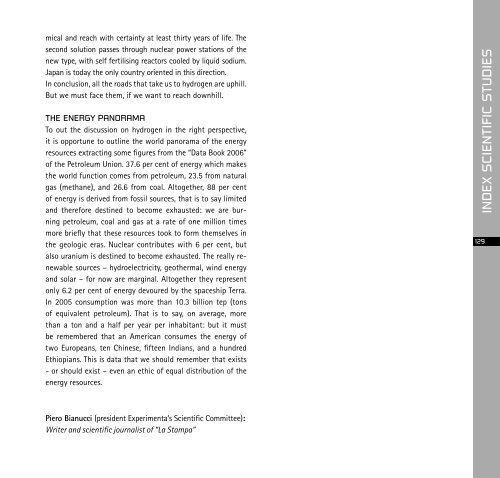Catalogo Experimenta 06
Catalogo Experimenta 06
Catalogo Experimenta 06
Create successful ePaper yourself
Turn your PDF publications into a flip-book with our unique Google optimized e-Paper software.
mical and reach with certainty at least thirty years of life. The<br />
second solution passes through nuclear power stations of the<br />
new type, with self fertilising reactors cooled by liquid sodium.<br />
Japan is today the only country oriented in this direction.<br />
In conclusion, all the roads that take us to hydrogen are uphill.<br />
But we must face them, if we want to reach downhill.<br />
THE ENERGY PANORAMA<br />
To out the discussion on hydrogen in the right perspective,<br />
it is opportune to outline the world panorama of the energy<br />
resources extracting some figures from the “Data Book 20<strong>06</strong>”<br />
of the Petroleum Union. 37.6 per cent of energy which makes<br />
the world function comes from petroleum, 23.5 from natural<br />
gas (methane), and 26.6 from coal. Altogether, 88 per cent<br />
of energy is derived from fossil sources, that is to say limited<br />
and therefore destined to become exhausted: we are burning<br />
petroleum, coal and gas at a rate of one million times<br />
more briefly that these resources took to form themselves in<br />
the geologic eras. Nuclear contributes with 6 per cent, but<br />
also uranium is destined to become exhausted. The really renewable<br />
sources – hydroelectricity, geothermal, wind energy<br />
and solar – for now are marginal. Altogether they represent<br />
only 6.2 per cent of energy devoured by the spaceship Terra.<br />
In 2005 consumption was more than 10.3 billion tep (tons<br />
of equivalent petroleum). That is to say, on average, more<br />
than a ton and a half per year per inhabitant: but it must<br />
be remembered that an American consumes the energy of<br />
two Europeans, ten Chinese, fifteen Indians, and a hundred<br />
Ethiopians. This is data that we should remember that exists<br />
- or should exist – even an ethic of equal distribution of the<br />
energy resources.<br />
Piero Bianucci (president <strong>Experimenta</strong>’s Scientific Committee):<br />
Writer and scientific journalist of “La Stampa”<br />
INDEX SCIENTIFIC STUDIES<br />
129


